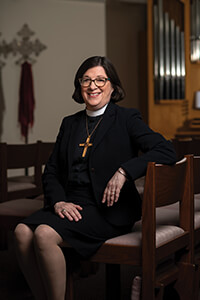God is with us
December 2, 2022
Sometimes the world just seems so solid. Reality is uncompromising and immutable. Literally, what you see is what you get, and our sight, our perception, is limited. So we forge on with all the obligations of daily life—family and work and taxes and deadlines. Our scope of existence becomes closed in, and our world gets smaller. Can this really be all there is?
The Christmas specials have started on TV, the familiar carols and songs are piped into grocery stores and shopping malls, and all kinds of media invoke the magic of Christmas. I don’t know about you, but for me the result is not uninterrupted joy but longing and a sense of loss. Look at the war in one part of the world that brings starvation to many, including children who are powerless. The pandemics of COVID-19 and racism and hate speech cause us to be suspicious of each other and turn inward upon ourselves. Peace on earth, goodwill to all cannot withstand the sharp limits of the real world.
Yet every Christmastime we try to create perfection. If we just get it all right—the decorations, the celebrations, the traditions, the family gatherings—we can push past the limits of the solid world. This effort leaves me exhausted and nostalgic. There must have been a better time, a simpler time, a purer time. And even, if by some superhuman effort, we can create the perfect holiday, how does it feel on Dec. 26?
It’s a funny thing, nostalgia. The word comes from the Greek nostos—return—and algos—pain. One scholar defined nostalgia this way: “the suffering evoked by the desire to return to one’s place of origin.” We have our origin story. It is the account in Genesis of Eden, where humankind lived in harmony with creation, a place of peace and plenty where God and God’s creatures walked together. I believe that in some mystical way the memory of our place of origin exists in each of us. When we listen to the prophet Isaiah at Christmas, we are assured that God will restore that place: “The wolf shall live with the lamb, the leopard shall lie down with the kid, the calf and the lion and the fatling together, and a little child shall lead them” (Isaiah 11:6).
The Incarnation is God’s supreme liminal work. It is the Thin Place where heaven and earth touch.
We can’t bring this about by ourselves. We can’t go back, nor can we will Eden into the present. And yet there are times and places where the space between heaven and earth seems to dissolve. The Celts called these “Thin Places.” The distance between heaven and earth collapses. It may only be a moment or feeling, but the sense that we are standing in the presence of the Holy becomes palpable.
During Advent and Christmas, the contrast between what the world is and what it was created to be is stark. We know that something is not right, but we also know that something is right. It’s out there somewhere. Nostalgia becomes more acute and so does our desire to bring heaven to earth during this season. This is God’s work, not ours.
The Incarnation is God’s supreme liminal work. It is the Thin Place where heaven and earth touch. It is the tie and place where the suffering caused by our desire to return to our place of origin is ended because God has begun a new story where heaven and earth are joined. “Unexpected and Mysterious” describes this: “In a momentary meeting of eternity and time, Mary learned that she would carry both the mortal and divine” (Evangelical Lutheran Worship, 258).
Our seemingly solid world with its own reality and truth gives way to the blessed inbreaking of heaven with the true reality. Our origin, present and future are one in God, and God is with us when we perceive it and, more importantly, when we do not.
This is the gift of Christmas.


